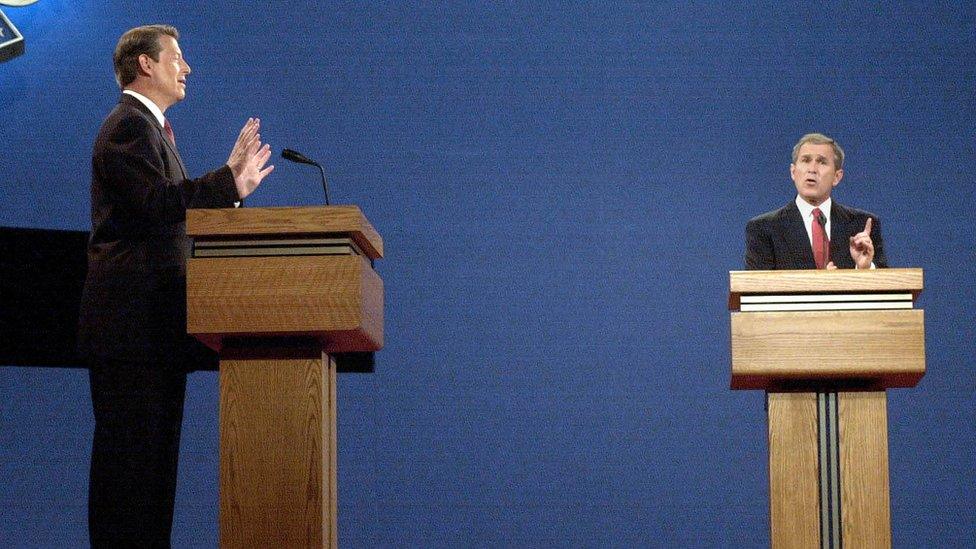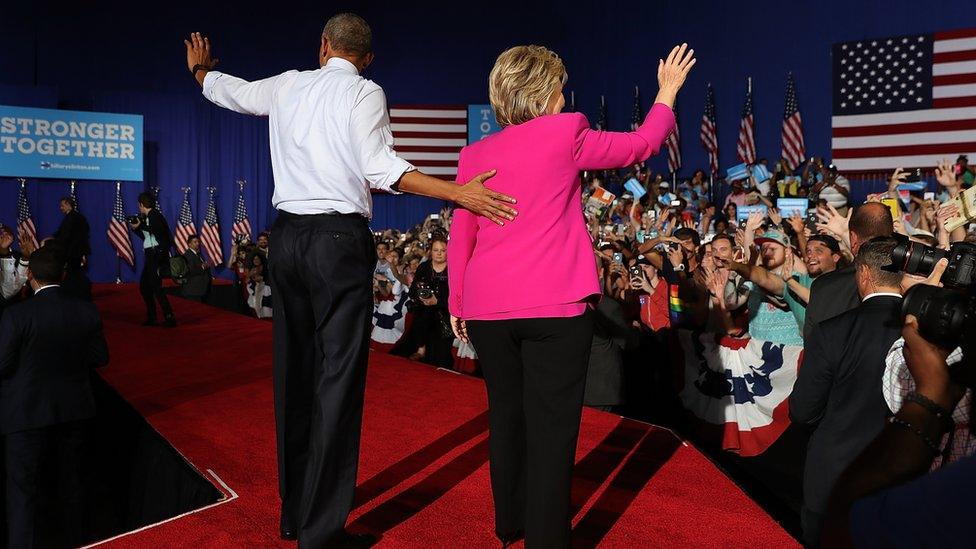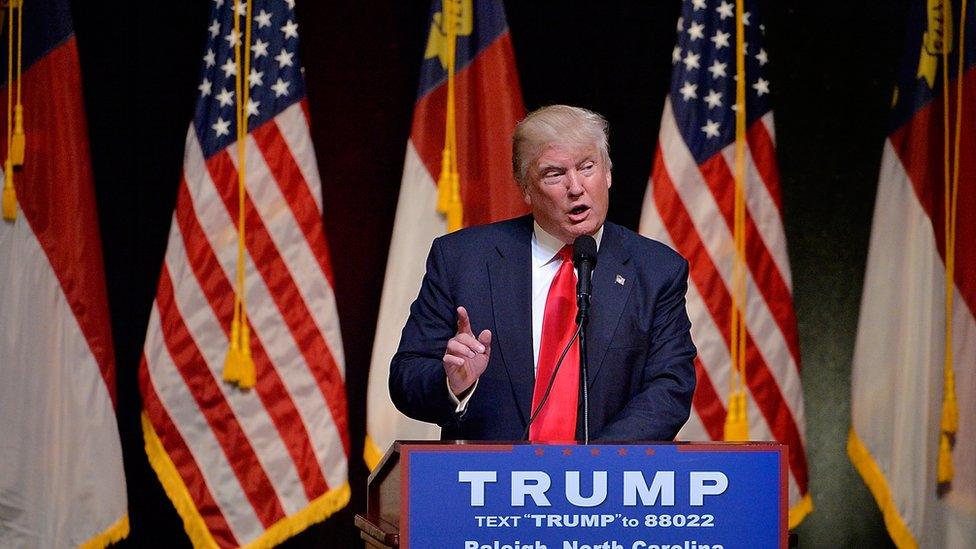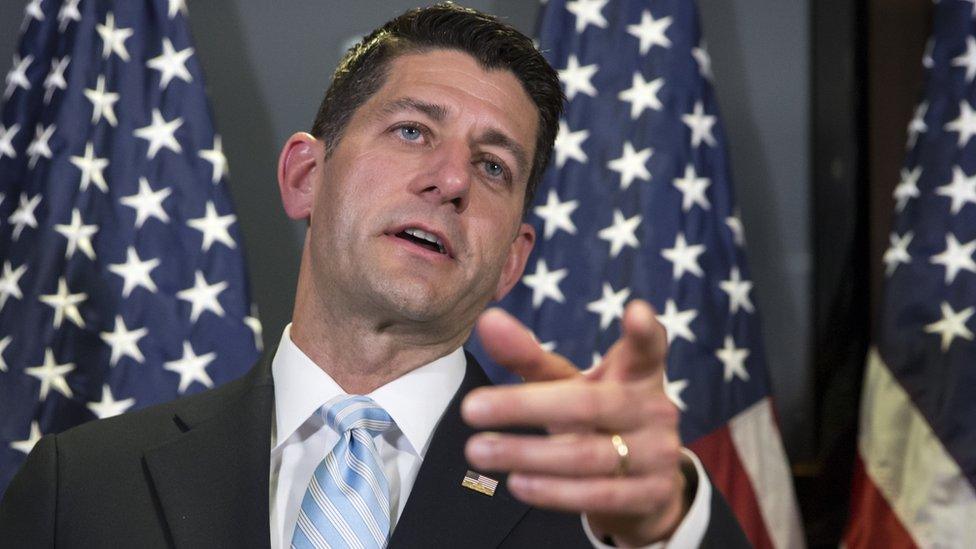Did the FBI just sink Clinton over emails?
- Published
Clinton, her emails and the FBI
The FBI investigation into Hillary Clinton's use of a private email server while secretary of state has concluded with a recommendation that she not face criminal charges.
While the fevered dreams of some on the right (and left, external) that Mrs Clinton would be frog-marched from campaign stage to jail cell have been dashed, the presumptive Democratic nominee's political pain is far from over.
But how bad is it, exactly? Here are some reasons why it could be a grievous wound - or nothing but a scratch.

Why it's bad
Explanations dismantled. Mrs Clinton had a carefully constructed series of justifications and defences for her email decisions while secretary of state. James Comey's unusual press conference exploded like a torpedo beneath the water line, sinking those efforts.
Mrs Clinton said she hadn't sent classified information. The FBI found more than 100 of her 30,000 emails (0.3%) contained details that were classified "at the time" they were transmitted and "a very small number" had markings "indicating the presence of classified information".
She also said she had turned over all her work-related messages, but in fact her lawyers relied on keyword searches to sort through the email files and consequently missed several thousand relevant documents.
Major media fact-checkers were quick to survey the scope of the damage.
Politifact said, external the FBI "clearly undercuts Clinton's defence". The Washington Post upgraded, external its verdict on the veracity of Mrs Clinton's classified information claims from two to four "Pinocchios". The Associated Press wrote, external that the FBI "left much of her account in tatters and may have aggravated questions of trust swirling around her Democratic presidential candidacy".
Polls show that many voters give Mrs Clinton low marks, external for veracity and openness - and these latest revelations will do nothing to help change this view.
It's a lead weight holding her overall approval ratings down when she needs to be generating enthusiasm and energy for her general election campaign.
Strength undermined. The Clinton team has framed much of its campaign as a contrast with Donald Trump, whom they are painting as a reckless and dangerous commander-in-chief.
The former secretary of state, they counter, is tested and competent - a steady hand on the wheel in troubled times.
But are steady hands labelled "extremely careless" with classified information by the FBI? Do they leave their personal communications open to possible "hostile actors", including sending emails on an unclassified system while "in the territory of sophisticated adversaries"?
On Tuesday afternoon the Trump campaign sent a press release leading with the charge that Mrs Clinton "compromised the safety of the American people".
"Our adversaries almost certainly have a blackmail file on Hillary Clinton," he wrote, "and that fact alone disqualifies her from service".
While there's no tangible support for that particular piece of Trump bluster, if the public doesn't buy Mrs Clinton's argument that she's the "safe" choice, much of the advantage she has on her sometimes intemperate opponent will disappear.


The establishment indicted. It has been a common theme in the presidential campaigns of Mr Trump on the right and Bernie Sanders on the left that establishment insiders live under their own set of rules.
While average Americans are left to their fate, big bankers get bailouts, big businesses get handouts, and the elite are insulated from the consequences of their actions.
For those with this outlook, the failure to indict Hillary Clinton - or even hold her accountable in a non-criminal manner - is yet another example of the benefits that come along with high positions of power.
While Comey insisted that there was little precedent for a prosecution given that Mrs Clinton did not intentionally mishandle classified information or do so in a "grossly negligent" way, such explanations may not fly with the swath of voters currently alienated from the political process.
In 1997 then-Vice-President Al Gore gave a press conference in which he said, external there was "no controlling legal authority" capable of ruling on whether his fund-raising activities violated federal law.

Al Gore faces questions about fundraising and lost - even though he was never charged
Although Mr Gore never stood accused of a crime, Republican George W Bush used his legalistic word-play to paint him as above the law again and again when the two squared off for the presidency in 2000.
Mr Gore was the Democratic heir apparent running to succeed a still-popular two-term president. He lost.
A trusted face. FBI Director Comey's just-the-facts delivery on Tuesday made the findings he presented all the more damaging to the Clinton campaign.
FBI Director James Comey said Hillary Clinton was "extremely careless" with emails
The charge that the former secretary of state was "extremely careless" would not have nearly the same impact if it came from a Republican politician. In fact, many conservatives have tried tagging Mrs Clinton with much, much worse.
Instead the man delivering the very public rebuke is a career law enforcement official with a sterling reputation for rectitude and probity.
Videos of Comey's statement have already found their way into a Republican attack advert, external - with many more sure to come.
And on Thursday Republicans in Congress will have the opportunity to elicit more potentially damaging sound bites from the FBI director when they call him to testify, external on his findings and the decision not to recommend criminal charges.
Most Americans may not have known who James Comey was before Tuesday, but chances are they're going to be seeing a lot of his face as the general election campaign heats up.

Why it's not bad
She wasn't indicted. If the news for Mrs Clinton on Tuesday was bad, it could have been much, much worse. When Comey approached the lectern, the Democratic candidate's staff had no idea what he would say. Would Mrs Clinton or some of her staff face charges?
While she wouldn't have been the first candidate even in this election cycle to run for president while under indictment, it still would have been a devastating blow to her campaign.

Clinton was already back on the campaign trail shortly after the announcement
Democrats would clamour for another candidate - possibly Mr Sanders or even Vice-President Joe Biden - to be nominated at their convention in three weeks.
Instead the fallout from the FBI investigation will be political, not criminal. Political damage control is something the Clintons know how to do. It's something they've been doing in the national spotlight for more than 25 years.
Shortly after Comey delivered his stern rebuke, the Clinton campaign was already trying to turn the page.
"We are pleased that the career officials handling this case have determined that no further action by the department is appropriate," spokesman Brian Fallon said.
With indictment off the table, one of the possible "wild cards" that could have thrown the race into chaos has been removed from the deck.
While the former secretary of state's reputation has been further damaged, the electoral advantages she - and the Democrats - have heading in to the general election are still intact.
Trump will overplay his hand. Often when Mrs Clinton seems to be in trouble, Donald Trump sweeps in with some news-cycle grabbing statement or action that spares her from the full force of the blow. His post-Orlando-shooting speech that criticised Muslims in the US was widely panned, and his boasts about how the UK Brexit vote would help his campaign while on Scottish soil sparked anger on both sides of the Atlantic.
Such missteps have been so pronounced at times that it's given rise to conspiracy theories that Mr Trump is actually a secret Democratic operative intent on electing Mrs Clinton and destroying the Republican Party from within.

Donald Trump couldn't help himself
Such paranoid fantasies were dusted off once again on Tuesday evening as Mr Trump made remarks during an off-the-cuff speech that put him squarely back in the spotlight.
While he started by re-enforcing the themes he had laid out in his press releases earlier in the day - that Mrs Clinton's email actions showed a dangerous lack of regard for US security - he soon lost focus.
He accused Attorney General Loretta Lynch of accepting a bribe in exchange for refusing to charge Mrs Clinton - an explosive accusation for a party standard-bearer to make, particularly given that Comey said he had not consulted with Lynch prior to issuing his report.
Then he offered praise for former Iraqi leader Saddam Hussein, who he said was a "bad man" - but one who was effective at killing terrorists.
While it was a line that Mr Trump had used in the past, it came when the media and fellow Republicans believed he should have been hammering Mrs Clinton on emails and nothing but emails.
Instead, the Clinton camp was able to fire off a release condemning Mr Trump's Hussein comments. Republican leaders like House Speaker Paul Ryan were forced to defend - or renounce - their presumptive nominee's remarks.
What should have been a poisonous news cycle for Mrs Clinton became a little less so thanks to Mr Trump.
Republicans will move on. While there was plenty of grousing among Republican politicians following Comey's announcement of no charges on Tuesday, the response was far from full-throated outrage.
Several congressional Republicans have called for, external an independent counsel within the Justice Department to investigate the matter further, but so far the move doesn't seem to be gaining much traction.

House Speaker Paul Ryan has criticised the FBI's decision
A free-ranging independent investigation could pose a significant risk to the Clinton campaign, heralding a new string of testimonies and subpoenas that would keep the matter in the news and leave open the possibility of perjury or obstruction of justice.
Instead, it seems, the House of Representatives will hold hearings looking into the decision not to indict, giving Republicans plenty of opportunity to grandstand - or come across as showboats.
There could be a move to formally censure Mrs Clinton - although Congress has few working days to act before its members head to the conventions and hit the campaign trail in earnest. House Speaker Ryan has also suggested cutting off Mrs Clinton's access to the security briefings given to presidential candidates. Such a development would be embarrassing, but it's unclear how Congress could force the executive-branch national security agencies that deliver the briefings to take such a step.
It's still early. If the Clinton camp could pick the best time for the FBI director to deliver a stern rebuke of Mrs Clinton, they probably would opt for right now, in the early July space between the end of the presidential primary season and the Democratic convention.
Voters won't weigh in on Mrs Clinton for another four months, giving the campaign plenty of time to recover.
In just over three weeks Mrs Clinton will take the stage in Philadelphia to accept her party's nomination, culminating days of positive press as major party stars - from President Barack Obama to Vice-President Joe Biden to Senator Elizabeth Warren to Bill Clinton - sing her praises.
On Tuesday night, just hours after the FBI announcement, Mr Obama was on stage with Mrs Clinton, showing just how enthusiastic he's going to be on the campaign trail for her.
No-one more qualified for this office than Clinton, says Obama
Even by next week political wags and pundits will be back to speculating about vice-presidential picks and the possible craziness in store at the Trump-led Republican convention.
Mrs Clinton's email imbroglio will cast its shadow on the campaign, but barring any new, explosive revelations - it's likely a wound that time can heal.